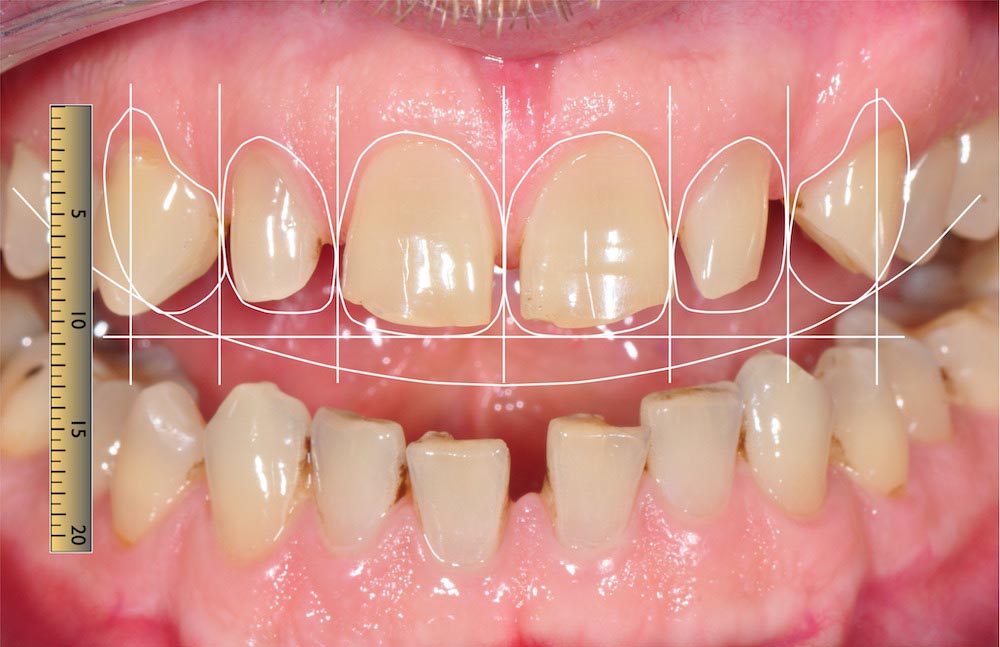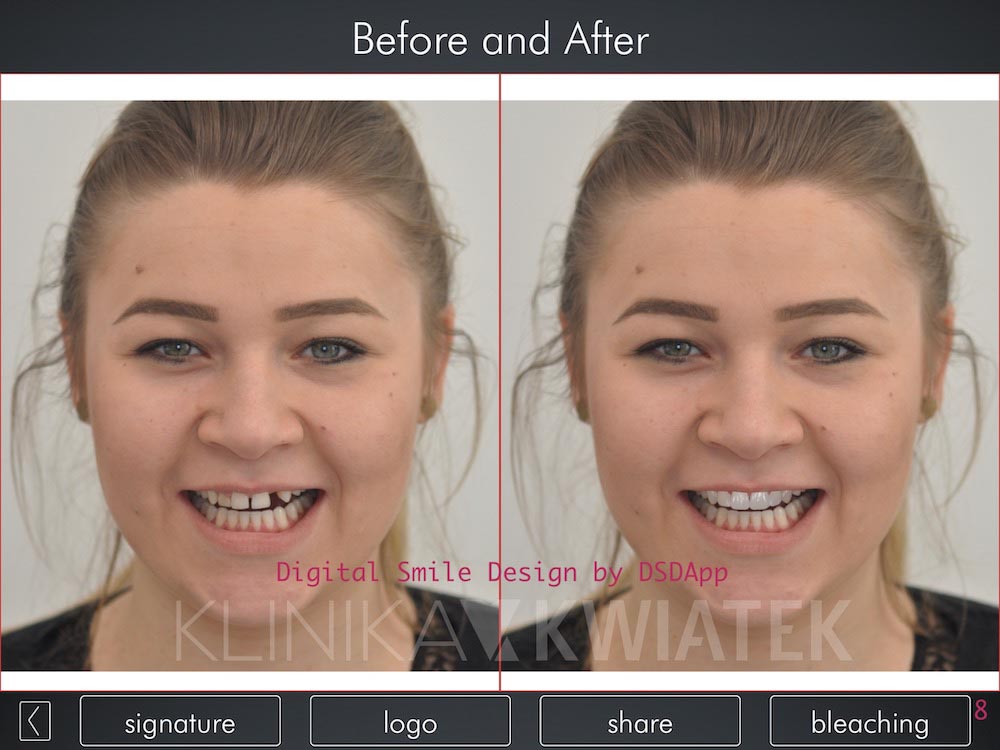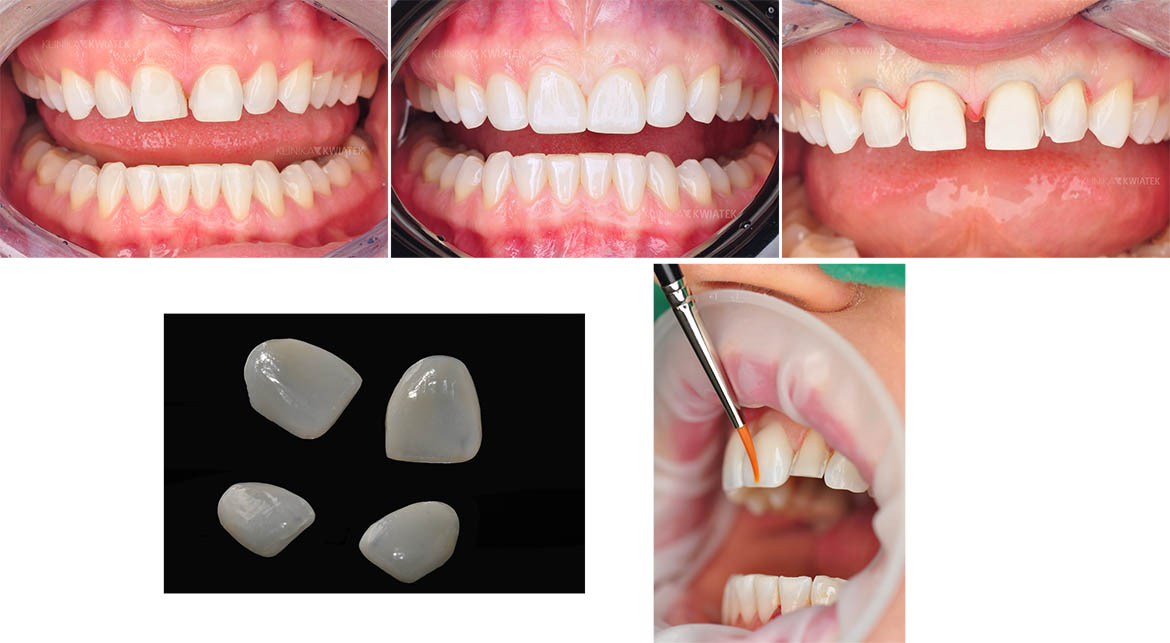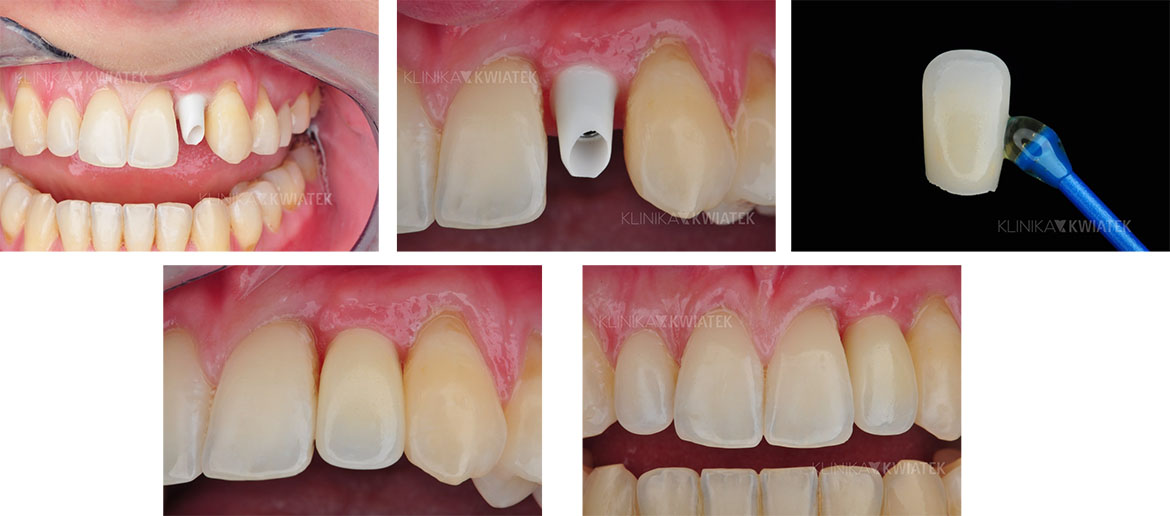Implant Prosthetics and Prosthetics Poznań
Prosthetic dentistry
In the era of digitization, nothing is impossible. After detailed diagnostics, bite scanning, and necessary imaging, the patient receives an individual treatment plan developed by the Kwiatek Clinic Team. The Digital Smile Design protocol, combined with the possibilities of modern dentistry, allows for precise planning of the future smile. Each visualization, as well as the finished prosthetic work, is unique - specific to each patient.


Porcelain bridges and crowns
The need for a prosthetic crown may arise as a result of the need to replace lost teeth. Porcelain crowns are classified as prosthetic restorations that allow for the aesthetic and functional reconstruction of a patient's teeth. We use them when a tooth, due to too much damage to hard tissues, is not suitable for reconstruction with composite material or we care about improving the aesthetics of the teeth. The color and shape of the crowns are individually selected and adjusted for each patient.
Crowns have many advantages, which is why they are often chosen by patients as a way to fill in dental gaps in the oral cavity. Among the advantages, we can mention:
- excellent and long-lasting aesthetic effect - it is impossible to distinguish a prosthetic crown from a natural tooth
- safety of use
- resistance to temperature changes
- they do not cause allergic symptoms
- high precision of execution
The preparation for the placement of the work involves grinding the tooth so that a new crown can be "put on" it. While waiting for the completion of the prosthetic work, a so-called temporary crown is applied, which is designed to protect the tissues. The procedure ends with the placement of the final crown, giving the tooth a natural, aesthetic appearance.
Porcelain crowns have a wide range of applications. They enable:
- correction of tooth shape (lengthening, shortening, widening, narrowing)
- elimination of discoloration (fluorosis, tooth death, discoloration, enamel developmental defects)
- changing the patient's tooth settings
- masking minor fractures when it is difficult to maintain traditional filling
- closure of gaps between teeth (diastemas and tremas)
All-ceramic crowns are a type of dental crowns that are entirely made of ceramics. These crowns consist of a uniform, continuous layer of ceramics, which is adapted to the shape and color of the patient's tooth.
All-ceramic crowns and their advantages:
- The ceramics used to produce all-ceramic crowns are very resistant to wear and durable, which means that these crowns are durable and can serve for many years.
- They have excellent aesthetics, they can be easily matched to the color of the patient's natural teeth, giving a very natural look.
- They are biocompatible, which means that they do not cause allergies or other allergic reactions in most patients.
- All-ceramic crowns are easy to keep clean and hygienic, as there is no metal substructure that can attract bacterial biofilm, plaque, and tartar.
- All-ceramic crowns are indicated in cases where the patient is allergic to metal or wants to avoid a metal crown substructure.
Porcelain bridges are permanent prosthetic restorations that are used to fill gaps after lost teeth. A necessary condition for the use of a bridge is that the patient has healthy teeth or implants that limit the gap on both sides. Prosthetic bridges consist of pillars - used for anchoring - and spans - replacement teeth filling the defect in the patient's oral cavity. The making of a bridge is preceded by the preparation of the pillars, i.e. the teeth surrounding the gap. Their size is reduced so that it is possible to place the span on them.
As with crowns, porcelain bridges are made of materials that allow them to be fully matched to the shade of natural teeth.
Both crowns and bridges are durable and can serve a person for a lifetime. To enjoy the effects of dental prosthetics for as long as possible, it is necessary to take good care of oral hygiene - brush your teeth at least twice a day using fluoride toothpaste, use dental floss and mouthwash, and regularly report for professional oral hygiene treatments.


Veneers
Veneers are thin plates (up to 1 mm thick) that are attached to a previously prepared tooth. This involves gently grinding the outer layer of enamel. In some cases, veneers can be applied without preliminary grinding. They not only improve appearance, but also enhance self-esteem. They allow for masking any aesthetic defects of teeth such as discoloration, uneven tooth color, visible fillings or improving the shape and surface of the tooth as well as eliminating diastema (gaps between teeth).
The procedure of applying veneers is simple and painless. Tooth preparation is minimally invasive. Their adjustment to the remaining teeth is done individually, with full cooperation between the doctor and the technician. Current solutions allow for the production of veneers so thin that interference with the natural tissues of the tooth is limited to the absolute minimum.
By using veneers we can:
- lengthen and enlarge teeth
- correct improper alignment
- whiten and remove strong discoloration
- conceal damaged enamel
- rebuild extensive cervical cavities
- close diastemas and tremas
- give a desired, previously designed shape

Implant Prosthetics
After the implant is fully integrated with the bone, we move on to the prosthetic stage. In most cases, the completion of the final work is done entirely digitally. The traditional impression is replaced by scanning the area of the implant and adjacent teeth. This minimizes the number of necessary visits, and the finished prosthetic work is characterized by excellent aesthetics and fit.
Modern dental treatment, including implant-based solutions, allows us to move away from outdated solutions, such as: full dentures, partial dentures (including skeletal dentures). These solutions are gradually being phased out due to many drawbacks that adversely affect conditions in the oral cavity and the patient's appearance.
Crowns and bridges on implants
In the case of missing one or several teeth, implants with a crown are currently the best possible solution. Unlike traditional crowns and bridges, they do not require interference with natural, healthy neighboring teeth. Each of the filled points functions separately, which greatly facilitates maintaining proper oral hygiene.
Depending on the conditions, crowns and bridges can be attached to implants, using a standard or individual connector. The individual connector is produced for the needs of a specific patient. It provides excellent support for the tissues surrounding the implant, ensuring ideal aesthetics. It is dedicated in situations where we care about the best possible reproduction of nature.

Prosthetic works based on implants in case of total edentulism
This is a full prosthetic restoration, a bridge composed of 10 or 12 crowns based on 4 or 6 implants ("all on 4", "all on 6"). The work is permanently fixed.
It is attached to the implants using a multi-unit system. This allows for the restoration of full aesthetics and bite function, to permanently say goodbye to removable dentures. During the healing period, the patient uses a temporary prosthesis.

Implant-supported dentures (overdenture)
Dental prostheses on implants eliminate the discomfort associated with the use of traditional dentures (mobility, mucosal abrasions). Based on 2 or 4 implants, they provide stabilization incomparable to classic removable fillings.
Special matrices, compatible with the implant, ensure maintenance. The ability to put on and take off independently ensures perfect hygiene maintenance.
Complete bite reconstruction with smile aesthetics improvement
In the case of complex reconstructions - when dental deficiencies are extensive - planning and efficient work of the entire Team play a key role. Kwiatek Clinic from Poznan gathers over 20 specialists from various fields, who constantly improve their qualifications. The patient can feel cared for from A to Z by the Team, which combined with the most modern technology translates into excellent and predictable results.

Prosthodontists
Meet the team of specialists who will take care of your beautiful smile.
This is what our Patients say about us
Prosthetics - Price List of Services
Prosthodontics
|
Prosthetic consultation 300 zł
Before undertaking prosthetic treatment, the doctor analyzes X-ray images and diagnostic models, and performs a computer smile analysis. Thanks to this, they can create a DSD (Digital Smile Design) project, which shows the final effect of the treatment even before it begins. |
|
Full ceramic crown 2 800 zł
Full-ceramic crown of the highest quality - cemented onto a previously prepared tooth. It strengthens its structure, and thanks to the digital design, it ensures a "cinematic" aesthetics. |
|
Ceramic Veneer 3 000 zł
Ultra-thin, porcelain "flakes" are applied to a minimally prepared tooth. This allows us to achieve an excellent aesthetic effect with minimal (up to 0.5 mm) interference in the patient's tissue. |
|
ONLAY, INLAY, OVERLAY 2 500 zł
|
|
Kois Deprogrammer 720 zł
|
Our services
- Implant prosthodontics / Prosthodontics
- Implantology
- Endodontic treatment
- Diagnosis of temporomandibular joint
- Digital dentistry
- Teeth whitening
- Orthodontics
- Periodontics
- Hygene procedures
- Dental surgery
- General dentistry
- Radiographic diagnosis
- Pediatric dentistry
- Dental physiotherapy
- Laser theraphy
- Dental crowns
- Venteers
- Bruxism
